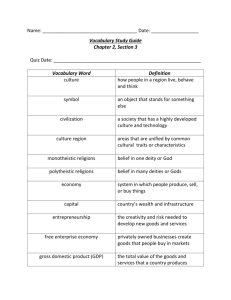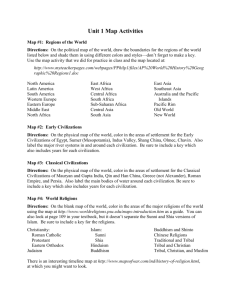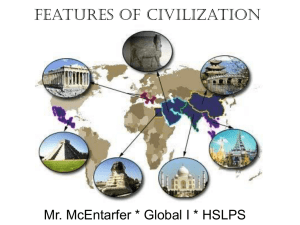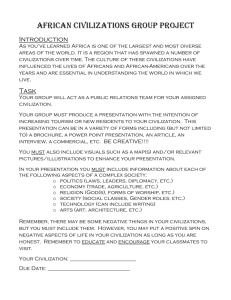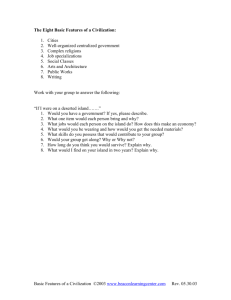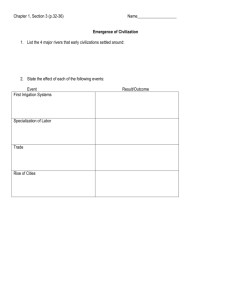World History Unit 1: Ancient Civilizations & Religions
advertisement
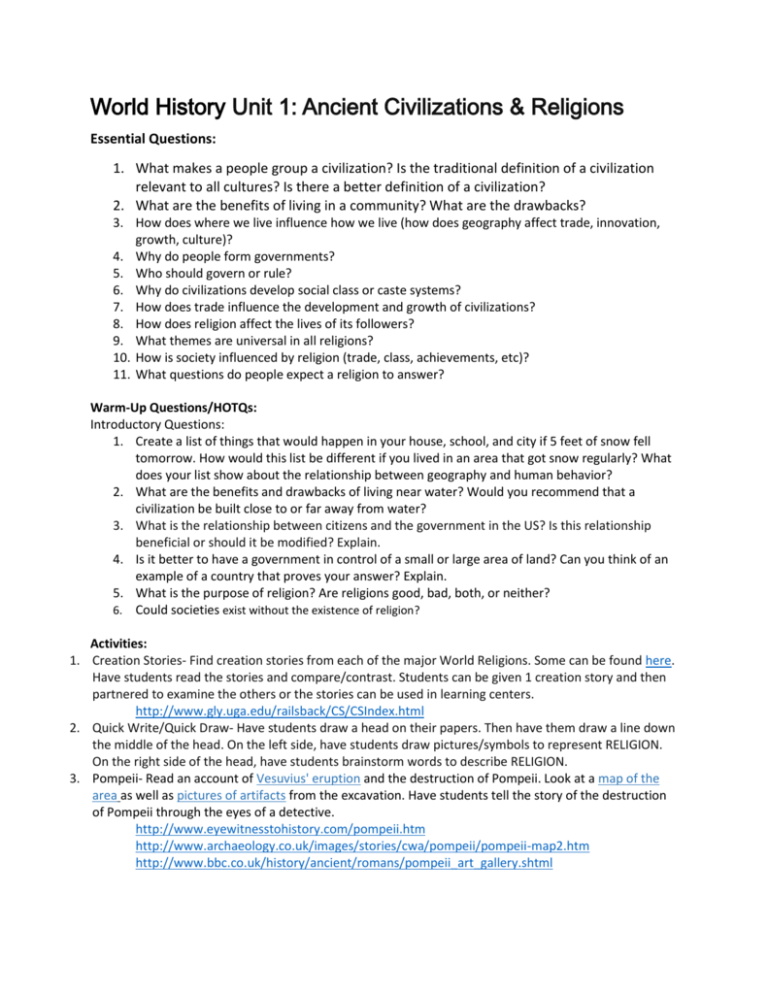
World History Unit 1: Ancient Civilizations & Religions Essential Questions: 1. What makes a people group a civilization? Is the traditional definition of a civilization relevant to all cultures? Is there a better definition of a civilization? 2. What are the benefits of living in a community? What are the drawbacks? 3. How does where we live influence how we live (how does geography affect trade, innovation, growth, culture)? 4. Why do people form governments? 5. Who should govern or rule? 6. Why do civilizations develop social class or caste systems? 7. How does trade influence the development and growth of civilizations? 8. How does religion affect the lives of its followers? 9. What themes are universal in all religions? 10. How is society influenced by religion (trade, class, achievements, etc)? 11. What questions do people expect a religion to answer? Warm-Up Questions/HOTQs: Introductory Questions: 1. Create a list of things that would happen in your house, school, and city if 5 feet of snow fell tomorrow. How would this list be different if you lived in an area that got snow regularly? What does your list show about the relationship between geography and human behavior? 2. What are the benefits and drawbacks of living near water? Would you recommend that a civilization be built close to or far away from water? 3. What is the relationship between citizens and the government in the US? Is this relationship beneficial or should it be modified? Explain. 4. Is it better to have a government in control of a small or large area of land? Can you think of an example of a country that proves your answer? Explain. 5. What is the purpose of religion? Are religions good, bad, both, or neither? 6. Could societies exist without the existence of religion? Activities: 1. Creation Stories- Find creation stories from each of the major World Religions. Some can be found here. Have students read the stories and compare/contrast. Students can be given 1 creation story and then partnered to examine the others or the stories can be used in learning centers. http://www.gly.uga.edu/railsback/CS/CSIndex.html 2. Quick Write/Quick Draw- Have students draw a head on their papers. Then have them draw a line down the middle of the head. On the left side, have students draw pictures/symbols to represent RELIGION. On the right side of the head, have students brainstorm words to describe RELIGION. 3. Pompeii- Read an account of Vesuvius' eruption and the destruction of Pompeii. Look at a map of the area as well as pictures of artifacts from the excavation. Have students tell the story of the destruction of Pompeii through the eyes of a detective. http://www.eyewitnesstohistory.com/pompeii.htm http://www.archaeology.co.uk/images/stories/cwa/pompeii/pompeii-map2.htm http://www.bbc.co.uk/history/ancient/romans/pompeii_art_gallery.shtml Vocabulary: Concept/Vocabulary Word Definition Civilization A society with cities, a central government, job specialization, and social classes Cultural Diffusion The spread of ideas, customs, and technologies from one people to another Dynasty A series of rulers from a single family Fertile Crescent Region in the Middle East that was the birthplace of civilization Neolithic Revolution The shift from food gathering to food production via farming which allows for the growth of civilization Nomads People with no permanent home, who move from place to place in search of food, water, or pasture Primary Source A firsthand account of events written by people during the time period in which they occurred Secondary Source An account or retelling of an event by someone who was not present at the event Theocracy A government controlled by religious leaders Alliance A formal agreement between two or more nations to aid and protect one another Citizen A person who owes allegiance to a country and is entitled to its protection. City-state A political unit with its own government structure that includes a municipality and its surrounding lands and villages. Cultural Diffusion The spread of ideas, customs, and technologies from one people group to another Democracy A government structure in which citizens participate in their government, usually through voting. Dictator A political leader with the absolute power and authority. Empire A group of countries or territories controlled by one ruler. Republic A government in which citizens chose elected officials to represent them. Schism A formal division of a religious or political group Deity A god or goddess that is the subject of religious worship. Heresy Any words or actions that go against the accepted teachings or practices of a given religion. Monotheism A religion that centers around the worship of one deity. Patriarchy Social system in which leadership, privileges, and inheritance is passed through males from generation to generation. Polytheism A religion that centers around the worship of multiple deities. Sect A subgroup or division of a larger religion. Links: Current Events: Choose 1 article and complete a current events summary using the template provided. You may email your article to me or hand write them; it is your choice. http://hmcurrentevents.com/world-history/ Textbook resources: links to topics, section quizzes, etc. (This is a different textbook from ours but you just need to look for the same topics and you can still use their quizzes, games, maps, etc.) http://www.classzone.com/cz/books/wh_ancient05/get_center_home.htm?rg=review_center Hyper History Timeline http://www.hyperhistory.com/online_n2/History_n2/a.html Penny Archaeology Activity http://www.smithlifescience.com/PennyArchaeology.htm World Religions/Textbook supplements: http://www.classzone.com/cz/books/wh_ancient05/page_build.htm?id=resources/jsp/chapter _links/World_regions Religions Map: http://maps.unomaha.edu/peterson/funda/MapLinks/ReligionMaps.html Creation Stories: http://www.gly.uga.edu/railsback/CS/CSIndex.html YouTube Review Videos: Soulja Boi’s Lesson on Mesopotamia http://www.youtube.com/watch?v=6thAH9PdBcI&feature=plcp&context=C37fcaefUDOEgsToP DskJMuohee0N-odxk0vHHK9xH Crash Course Videos: Go to www.wecakimsmith.pbworks.com and view the crash course videos and review PowerPoint notes on your own.
